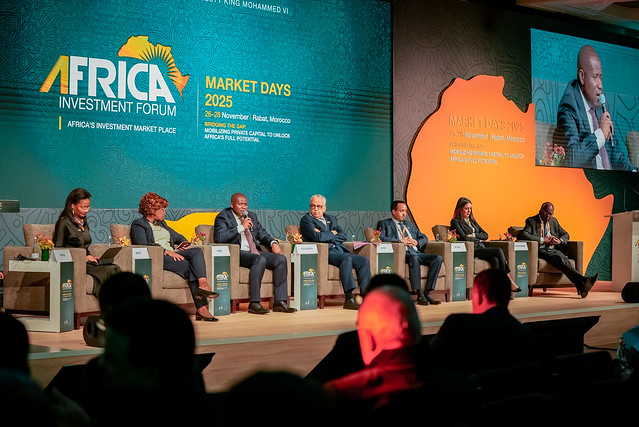Private Investment Key to Africa’s Growth, Say Finance Ministers
African finance ministers at the 2025 Africa Investment Forum (AIF) have urged a decisive shift from showcasing potential to delivering bankable projects, emphasising that private capital – not aid – must be the engine of the continent’s economic transformation.
Speaking during a Ministerial Dialogue on Accelerating Private Investment Through Conducive Enabling Environments, ministers from Côte d’Ivoire, Ethiopia, Guinea, Mauritania, Morocco, and Zambia discussed ways to improve regulatory frameworks, build investor trust, and support resilient business ecosystems capable of attracting long-term private sector participation.
Côte d’Ivoire’s Minister of Economic Planning and Development, Nialé Kaba, highlighted the importance of strengthening project preparation and follow-up mechanisms to attract private investment.
“Africa’s problem is that opportunities and projects are not mature,” Kaba said, pointing to Côte d’Ivoire’s reforms, including streamlined investment codes and single-window services, which helped raise private investment from 12% of GDP in 2020 to 20% today.
Zambian Minister of Finance and National Planning, Situmbeko Musokotwane, noted that Zambia is emerging from its debt crisis following a recent ratings upgrade. Over the past three years, the country has signed nearly US$2 billion in public-private partnership projects and attracted more than US$7 billion in new mining investment.
Musokotwane added that Zambia is mobilising billions in private energy investment and has streamlined project approvals to under 45 days. He highlighted the Lobito Corridor, a privately financed rail link set to become Africa’s first east-west transcontinental railway, connecting Zambia and the Democratic Republic of Congo to Angola’s Atlantic coast, and reshaping regional trade.
From Morocco, Economy and Finance Minister Nadia Fettah stressed that investors are seeking profitability and execution-ready projects, not promises of potential.
“We are being asked for ready projects, delivered with speed and strong execution capacity,” Fettah said, advocating for year-round preparation of regional project pipelines. She cited sectors such as railways, aviation, and data centres, emphasising that pooling resources and coordinating efforts will allow African nations to pursue large-scale infrastructure projects successfully.
Mauritania’s Minister of Economic Affairs and Development, Abdullah Suleiman Sheikh Sidiya, welcomed Africa’s shift from the aid-dependent image of the 1990s. “Africa is becoming a sought-after destination – not only for cooperation but increasingly for investment,” he said.
Guinea’s Minister of Planning and International Cooperation, Ismael Nabe, explained that Guinea is leveraging international partnerships to replicate successful development projects across the continent. He cited the UK-Export Finance-backed Administrative City as an example, noting that what works in one country, such as Côte d’Ivoire, can be adapted and scaled elsewhere.
Ethiopian Finance Minister Ahmed Shide highlighted reforms aimed at transforming the economy, including foreign exchange liberalisation, customs modernisation, and the establishment of a securities exchange. Ethiopia is pioneering innovative financing tools such as securitisation, blended finance, and credit enhancement to fund flagship projects like Bishoftu International Airport.
The forum highlighted a unified message: Africa’s development model has shifted decisively towards private capital. Ministers emphasised that governments must drive pipelines of execution-ready projects, supported by robust reforms and strengthened regional integration, to unlock the continent’s vast economic potential.



